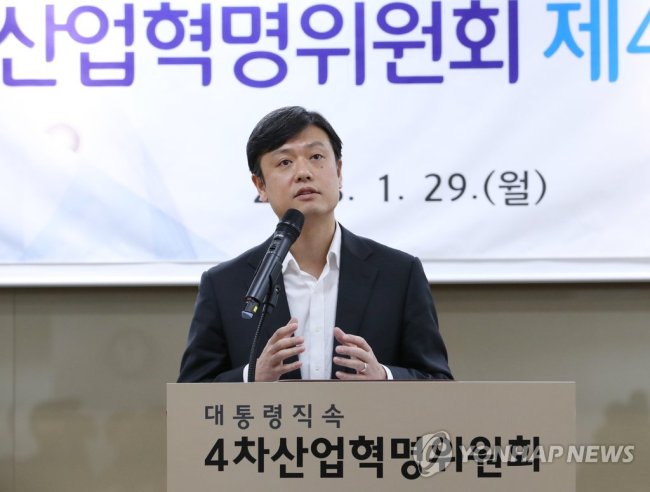he South Korean government confirmed Monday its plan to develop smart cities over the next five years, choosing Sejong and Busan as test beds.
The Presidential Committee on the Fourth Industrial Revolution said it selected districts in the administrative hub city Sejong and port city of Busan as places to apply innovative technologies, including autonomous driving, artificial intelligence, smart energy management and virtual reality, in order to make them world-renowned smart cities by 2023.
The 274.1 million-square-meter district named Yeondong-myeon in Sejong, Chungcheong Province, which is home to government officials working for ministries and agencies, will be developed as a smart city focusing on energy and transportation, the committee said.
 |
Chang Byung-gyu, head of Presidential Committee on Fourth Industrial Revolution, speaks at a meeting on Monday. (Yonhap) |
The 219.4 million-square-meter area dubbed “Eco Delta City” in Busan -- near Gimhae Airport -- will be developed with a goal of becoming a global logistics city. To maintain its port city image, the smart city will be provided with hydrothermal energy.
The government-led smart city projects are to be “human-centered,” the committee highlighted.
For instance, if a fire breaks out, sensors in nearby buildings will sound the alarm to alert people around the neighborhood. Fire engines will be guided by a disaster control tower in the region to take the fastest route to the scene.
Living in smart homes, residents of the smart cities will receive information regarding the weather and fine dust in real time. Their commuting times will be reduced with the help of vehicles and drone taxies based on an intelligent transportation system.
The committee plans to begin construction in the districts in the first half of next year.
“A smart city is a meaningful platform where all technologies and services born from the ‘fourth industrial revolution’ can be realized,” Chang Byung-gyu, head of the committee, said at a meeting.
President Moon Jae-in has also emphasized smart cities as an important policy task that will allow people to experience the fourth industrial revolution.
The fourth industrial revolution has become an economic mantra of the Moon government, which focuses on boosting industrial sectors such as self-driving, drones and robots as new growth engines.
With the participation of six government branches, including the Ministry of Land, Infrastructure and Transport, Ministry of Strategy and Finance and the Ministry of Science and ITC, the smart city projects will be expanded from Sejong and Busan to Naju, South Jeolla Province, and Gimcheon, North Gyeongsang Province, the committee said.
“In order to have smart cities settle down as a sustainable platform, it is important to induce participation from citizens and private businesses to address problems together,” Chang said.
Compared to state-run development projects where decisions were unilaterally made by the government and led by public institutions, the committee vowed to lead the upcoming projects based on “open expandability” that will encourage the private sector to take part in realizing smart services.
“A pan-governmental collaboration system and participation from the private sector will be necessary to make the test-bed cities successful,” said Sohn Byoung-seok, first vice minister at the Land Ministry.
By Song Su-hyun (
song@heraldcorp.com)








![[Weekender] Korea's traditional sauce culture gains global recognition](http://res.heraldm.com/phpwas/restmb_idxmake.php?idx=644&simg=/content/image/2024/11/21/20241121050153_0.jpg)